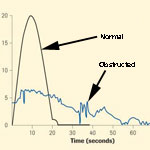Professionals
BAUS Business
Diagnosis of Lower Urinary Tract Symptoms Resulting from Benign Prostatic Hyperplasia
19 March 2015
An article for GPs by Roger Kirby, John Anderson & Adrian Joyce
Curriculum statement 10.2: Men's Health outlines the role of the GP in dealing with benign prostatic hyperplasia. Specifically, it is expected that GPs should:
 be able to manage the primary contact of men who present with a genitourinary problem
be able to manage the primary contact of men who present with a genitourinary problem- have knowledge of "prostatism" and benign prostatic hypertrophy, including the principles of primary care treatment
- be able to describe the indications for and role of the prostate-specific antigen (PSA) blood test and evaluate the arguments for and against a national PSA screening programme
- be able to perform a digital rectal examination
- have knowledge of secondary care investigations, including prostate biopsy
- be able to explain the indications for urgent referral to specialist services, including for suspected prostate cancer
To access this article, click here for the full text (requires login and password)
or here for a PDF download (opens in a new browser window)
View other news